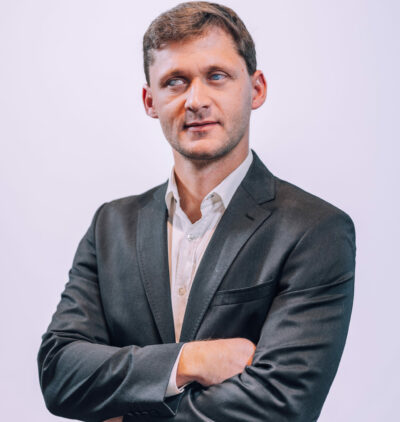Hendri Herbst
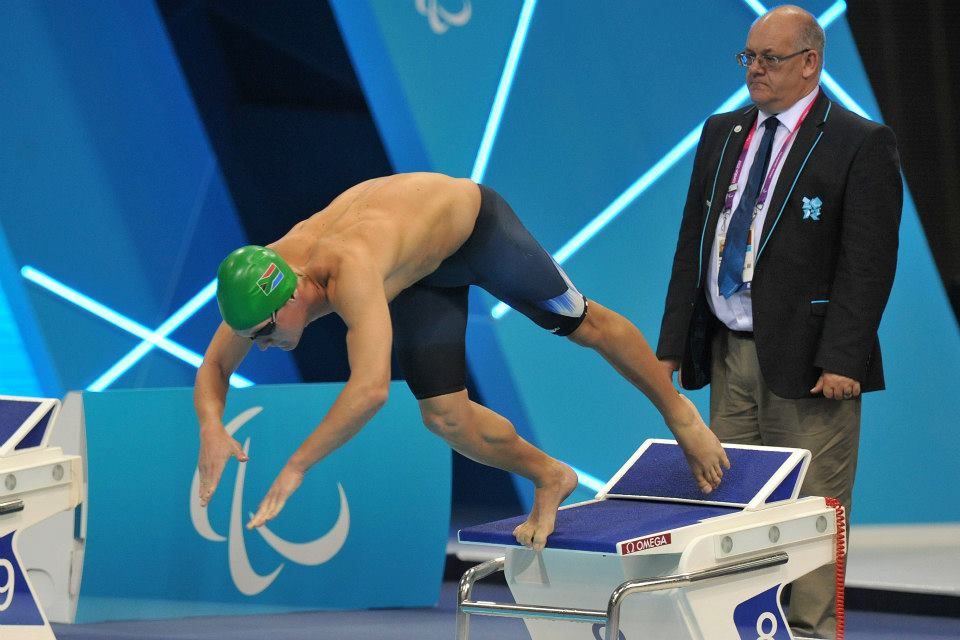
Hendrik "Hendri" Jacobus Herbst is oorsponklik vanaf Letsitele naby Tzaneen in die ou Noord Transvaal. Hendri was 'n leerling by the Pionier Skool vir blindes in Worcester enhet hy later by the Universiteir regte swot en 'n LLD graad behaal.
Hendri Herbst was born with glaucoma and at age 14 he was completely blind.
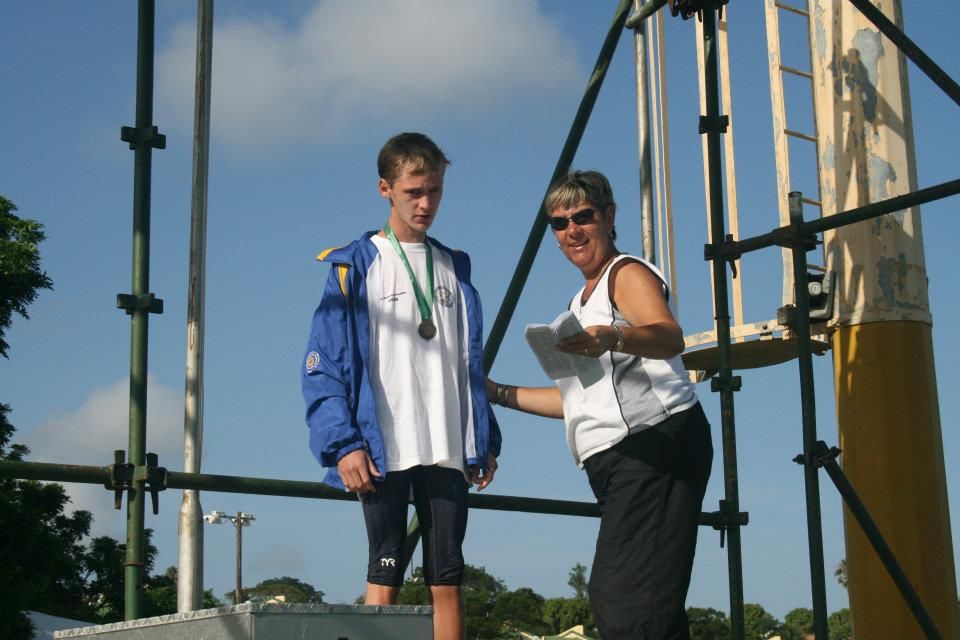
Hendri Herbst SA skole Oos-Londen 2008
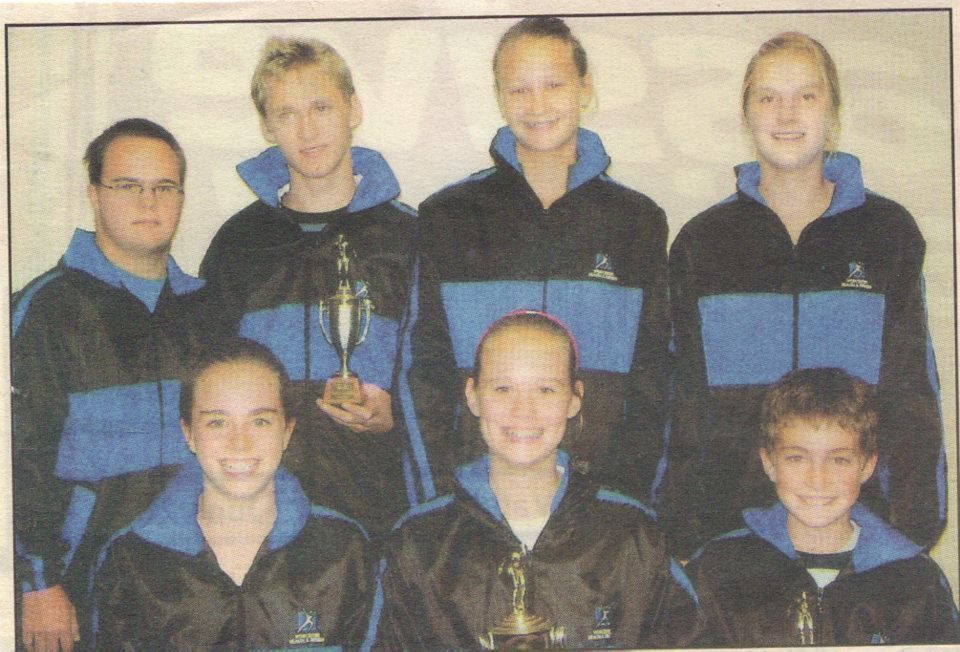
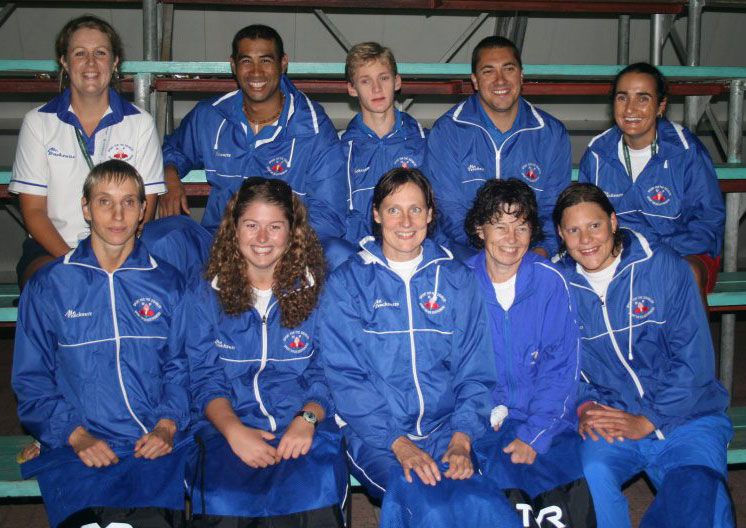
2008 Western Province Disabled swimming team - Natalie du Toit and Achmat Hassiem with Hendri Herbst.
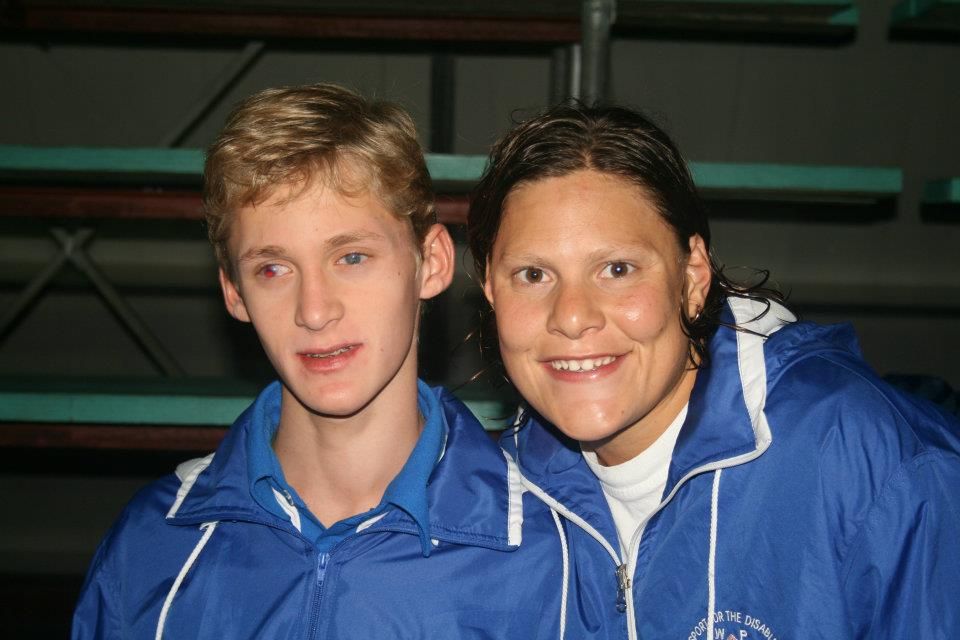
Sportlui met gestremdhede presteer internasionaal
31 Augustus 2009
Lede van die Maties-Helderberg Sportklub vir Persone met Gestremdhede, het die afgelope maand internasionaal puik presteer. In die VSA het die visueel gestremde swemmer Hendri Herbst, SA se naam hoog gehou by die International Blind Sport Association (IBSA) se Jeug- en Studentespele, in Colorado Springs. Die byeenkoms is by Amerika se Olimpiese Oefensentrum aangebied.
Hendri se harde werk van die vorige maande is beloon met persoonlike beste tye in sy items en met verskeie medaljes – een goud, twee silwer en een brons. Verder het hy, nog ’n SA swemmer en twee Nieu-Zeelanders saamgespan om goud te wen in die 4 x 50m vryslag-aflos.
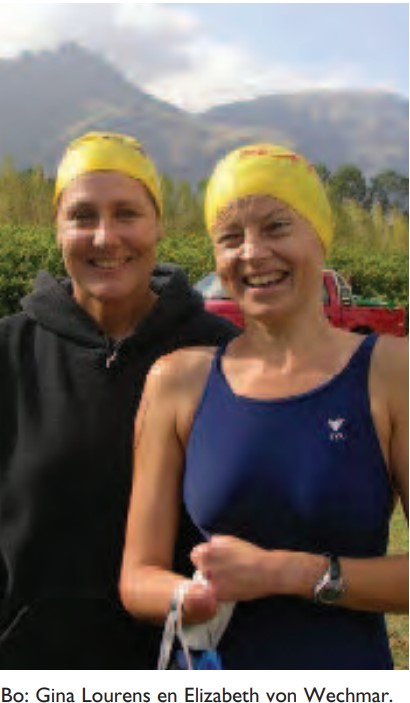
Die vroueswemmers, met Gina Lourens aan die spits, is gekies om Ierland in Oktober by die Europese Langbad Swemkampioenskappe in Ysland te verteenwoordig.
Gina wag saam met Elizabeth von Wechmar in spanning om te hoor of die Internasionale Paralimpiese 5Km Oop Water-kompetisie in Seoel gehou gaan word nadat dit weens onrus in Julie afgestel is.
Mexico City 2017: Hendri Herbst’s medal hopes
South African swimmer aiming for first world title at fourth Championships.28 Aug 2017
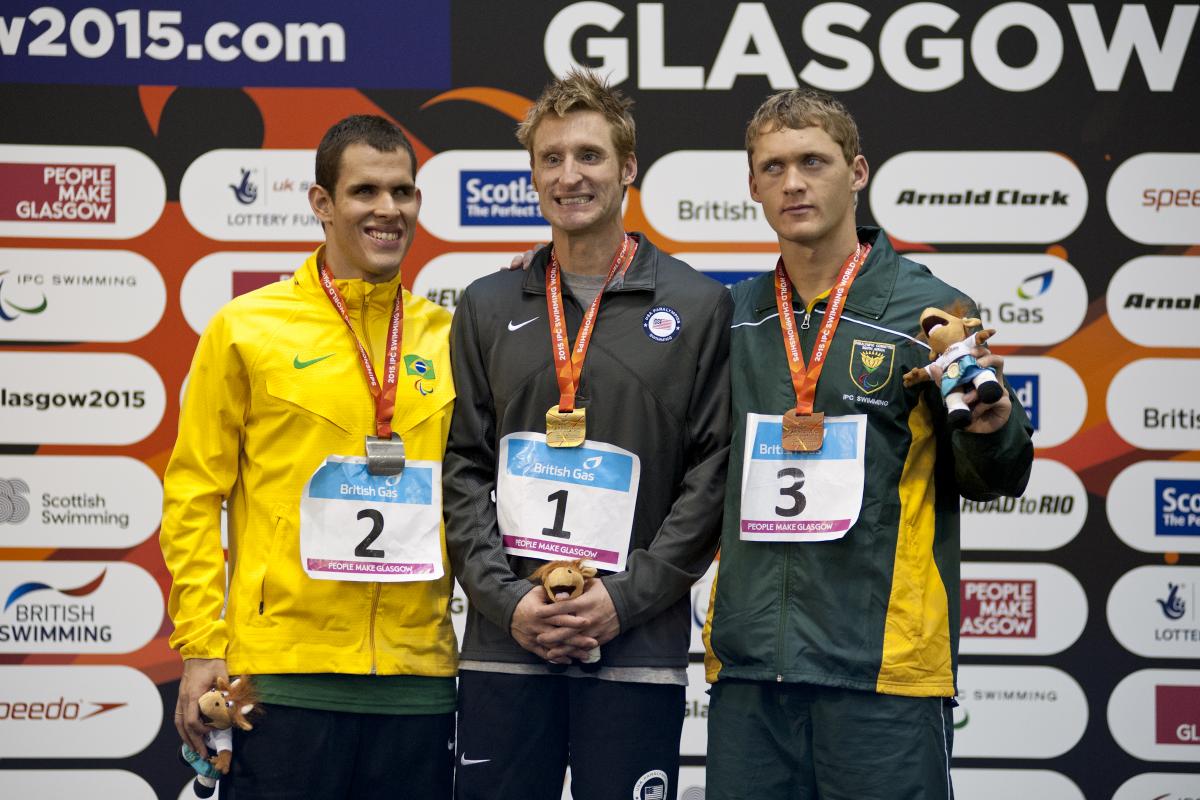
Hendri Herbst(R) won bronze in the men's 100m Freestyle S11 at the 2015 World Championships in Glasgow.
“In Mexico, my focus will be to swim a good time, the rest will take care of itself. Winning gold is always on the table."
South African swimmer Hendri Herbst has undergone many changes in his life since competing at the Rio 2016 Paralympic Games. He got married, started working with a new coach and entered the final year of his law degree.
With so many things in his mind, the 25-year-old’s preparation for his fourth World Para Swimming Championships in Mexico City has not been ideal. But Herbst stays optimistic.
“I also had an injury in my shoulder and needed to follow a long rehabilitation process,” he said. “This said, the preparation is going well. At this stage, we are still building up the training, but you can’t go from 0 to 100% overnight.
“In Mexico, my focus will be to swim a good time, the rest will take care of itself. Winning gold is always on the table. It all depends on that day. If it is my day this year and everything falls into place, it is possible.
“I think everyone that swims a race, swims it to win it. I know the competition will be strong, but I at least want to medal.”
At the latest edition of the World Championships in Glasgow, Great Britain, in 2015, Herbst took two bronze in the men’s 50m and 100m freestyle S11. “I had a few good races. At that stage, the focus was on Rio 2016, though. Unfortunately, it is also where I injured my shoulder.”
Due to his injury, his performance at last year’s Paralympic Games was not as expected.
“Rio was full of mixed emotions. I was super proud to be able to go to my second Paralympics. I think I did well under the circumstances,” said Herbst, who won one bronze at London 2012.
“Obviously, I was very disappointed that I did not medal. The build-up and preparation was far from what I would have wanted. My shoulder limited us significantly to such extent that I was not even sure that that I would be able to qualify at the start of 2016.
“After the heat of my 100m freestyle S11, the doctors asked if I was sure I wanted to swim the final. For me it was a no brainer. I did not work for four years to withdraw from my main race.”
Herbst ended fourth with a time of 59.71 behind USA’s Bradley Snyder (56.15), China’s Bozun Yang (59.51) and Japan’s Keiichi Kimura (59.63).
“Pain and all, I swam my race. Looking back, anyone had the potential to medal in that final. It was one of the closest races of my life. Despite everything, I still had a great time,” he recalled.
Just keep straight – Hendri Herbst
Jun 22 2016
Hendri grew up in Letsitele close to Tzaneen, in the Northern part of South Africa. The area is known for its tropical weather, thus the Herbst family had a large swimming pool. For that reason, when Hendri was only six weeks old, he partook in a drown proof course as a precaution due to his bad eye sight. From that moment onward, he basically grew up in the swimming pool.
When Hendri was five years old his family moved to the Western Cape. At age 15, he joined the local swimming club, and not long after that he received his Western Province provincial swimming colours. In 2009 he participated in his first international tournament, and in his matric year, 2010, he swam in the World Championships.
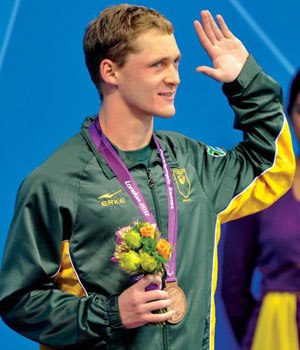
Podium moment at the London 2012 Paralympics
With a few successful international tournaments behind his name and a school career that came to its end, Hendri decided to go to Stellenbosch University. Unlike most students, his main goal for going to the university was not to obtain a degree, but to pursue qualifying for London 2012 Paralympic Games. Nonetheless, in 2011 he enrolled for Socio-informatics and graduated in 2013. He kept his eye on his goal, and qualified to represent his country in four items at the London Paralympics. Hendri made the finals for three of the events and won a bronze medal for the 100m freestyle; “dit was ‘n belewenis.”
Being able to win a medal in his first Paralympic Games was indeed a glorious moment, considering that the sacrifice went beyond merely spending hours and hours in the swimming pool. It was the everyday courage to choose life, and the abundance thereof.
I came that they may have life, and that they may have it more abundantly- John 10:10
Hendri was born with glaucoma, meaning that the optic nerve at the back of his eye was slowly being destroyed. Fortunately, his dad is a medical doctor and noticed that there was something wrong with his eyes when he was only two days old. At first Hendri was able to see clearly and he slowly started to lose his sight over the years, “dis asof jy sand in jou hand het, and it basically slips through your fingers.” Hence, Hendri attended a mainstream school until grade six, and then moved to a school for the blind. At the age of 12 years old, his sight started to change drastically, and at about 14 years old he was completely blind.
“Ek het opgehou tel by operasie 45…my laaste operasie was toe ek 14 jaar oud was.”
I can only imagine how perplexed and fearful he must have been during those early stages. The many questions floating around in his head: Why me, why now…? When I, Bianca, look back at being 12-14 years old, it was such an uncertain phase of my own life. I remember that my eyes started to strain a lot, and I had many headaches. Consequently, I received my first pair of glasses in grade six. I had big glasses and on top of it, my face looked like a pineapple with all the zits it was covered with. Erick Erickson, developmental psychologist, states that the psychosocial crisis that a person should master during his/her adolescent years (12-18) is that of identity versus role confusion. Key questions such as “who am I?”, and “where do I fit in?” are being dealt with. It seems like I never really graduated from this stage…oops!! At age 32, I am still asking those questions, and even without the big glasses and pineapple face, I might still carry some of the feelings of being the ugly nerdy girl.
However, Hendri knew one thing about himself at that crucial age. He knew that he loved being in the water, and he knew that he could swim. He might have lost his sight, but he was able to recognise that he did not lose his legs and his arms. He could still swim! “Swem het my gehelp, dit was n platform om myself te bewys.”
Many times when we experience a tragedy or a loss, we seem to internalise that all is wrong with the world, and we tend to sulk in a corner feeling sorry for ourselves. Hendri shared that his parents never allowed him to do this. There was no differentiation in treatment between him and his older brother, “ek was groot gemaak met die houding van dat die lewe skuld jou niks.”
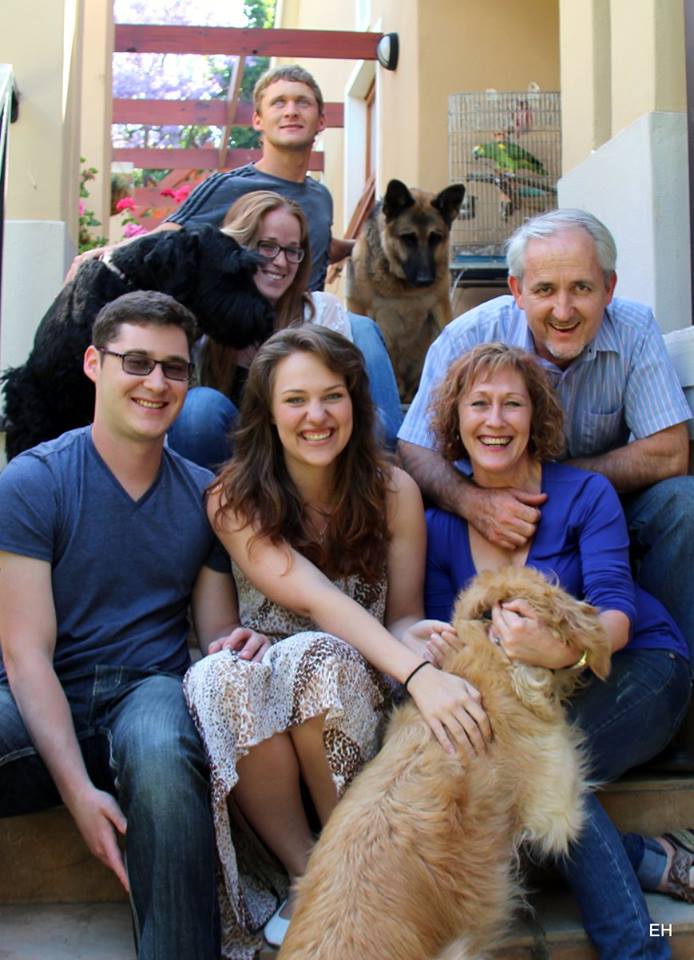
The Herbst family
He recalls looking for his shoes and going to his parents telling them that he could not find his shoes. His dad would then simply tell him that he needs to open his eyes and go look for them again. Hendri gave the biggest smile and said, “Ek gaan toe maar terug en wragtig, daar kry ek my pantoffels”. At times, the tough love might not have been easy to give, or to receive, but Hendri’s parents knew that they could not raise him to be dependent on them. He was too talented to sit at home and feel helpless. They did achieve their goal; as he is traveling the world with his guide dog Stan; he is married to a beautiful woman; and he is busy with his second degree at Stellenbosch University. He is also a Paralympics medalist: the highest honour in an individual sport like swimming.
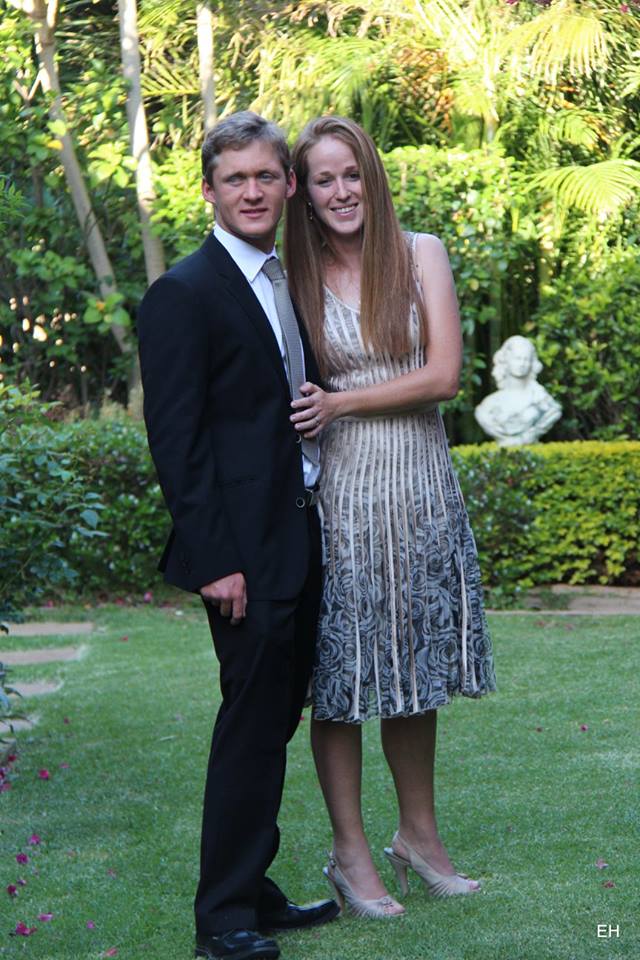
Hendri and his wife
For five years Hendri had to walk without his guide dog, Stan. One is only able to apply for a guide dog from the age of eighteen. After waiting for so many years it took eighteen more months after applying for the dog for the match to be made. Nonetheless, from the start of 2012, Stan was on Hendri’s side. Stan was the perfect match as he also enjoys a good swim. However, at times Stan thinks that Hendri is shorter than what he actually is. A few years back at a tournament in Durban, as Hendri was on his way to race in the finals, he suddenly found himself on his bum on the floor, as he walked straight into an electricity box.
Fortunately, there were not many of these instances as Hendri sings Stan’s praises for being one of the best guide dogs ever. A man’s best friend stays a man’s best friend, through thick and thin. And who else than your best friend to be the perfect wingman. One summer’s afternoon in Stellenbosch, Hendri took Stan for a run. As Hendri waited at his car for Stan to return after running on his own, on that day Stan did not return empty handed. An infectious "hello" from a girl, a few heart beats, and Hendri knew that Stan just brought his wife to him. Hendri and Brigitte Glanzmann, who finished her doctorate degree last year in Human Genetics, will be saying “I do” at the end of this year. Brigitte fits in well with the medical family as Hendri’s mother is a qualified speech therapist and as mentioned before his dad is a medical doctor.
Apart from a few colourful moments with Stan, Hendri has also hit his head in the swimming pool a couple of times, “die uitdaging met blind swem is maar om te probeer reguit hou.”
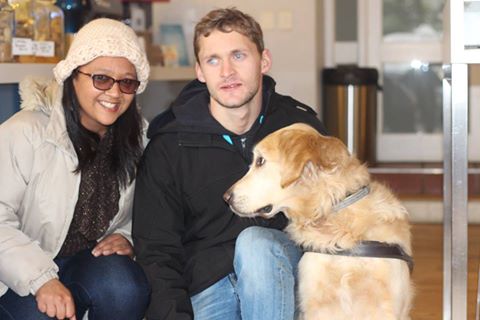
Protective Stan, giving me the look!! 🙂
Although Hendri has the straight swimming under his belt, his other challenge is not knowing where the end of the pool is. Each swimmer may design his own ‘hammer’ which is used to tap them on the head, to indicate where the edge of the pool is. Each swimmer is also allowed to indicate his/her own distance of when to receive the tap. Hendri uses a modified fishing rod with a soft ball at the end, and receives his tap with two strokes left before he needs to turn around, and one stroke left before he touch to finish. There were a few times when he did not feel the tap and face planted against the edge of the swimming pool. During World Champs 2015 in Scotland, he was tapped ahead of the two stokes left, and as he turned around he kicked what felt like an ocean of just water, “dit was die aakligste ooit.” He then had to turn back and swim back to the edge.
Although Hendri is living a very successful life, it is not without challenges, and at times challenges beyond his control. Hendri wanted to do his honours in Socio- informatics, but was told that the course was too visual for him to continue, although he cum-lauded that part of his degree. He consequently started to study a new degree, and should finish his LLB postgraduate next year. One other challenge is not being allowed to bring Stan into certain restaurants, “dis soos om vir iemand in n rolstoel te sê: los jou rolstoel buite.”
Notwithstanding, Hendri keeps his mind occupied with the positive side of life. It reminded me of a scripture in Philippians 4:8 “Whatever things are true, noble, just, pure, lovely, whatever things are of good report, if there is any virtue, and if there is anything praiseworthy – meditate on these things.”
I was encouraged by Hendri’s positive outlook on life, and all the things he has already achieved. He will be participating in three events at the Rio Paralympics. He is ranked second
Hendri is indeed an inspiration to not only those who are blind, but all of us who are faced with loss and disappointment. He kept on moving straight ahead, in the pool and in all other aspects of his life.
https://www.beeconectar.com/post/just-keep-straight-hendri-herbst
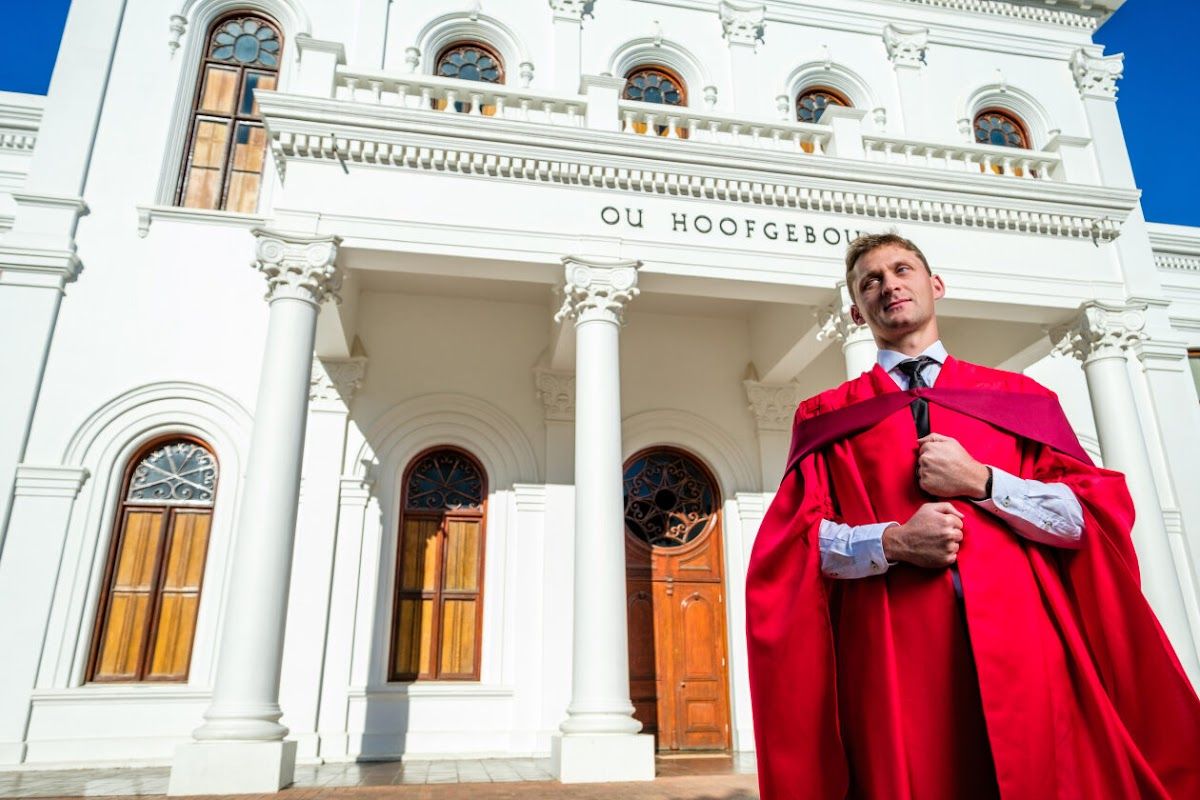
'Completing my doctoral degree is equivalent to the Olympic Games' — Hendri Herbst
Paralympic medal-winning swimmer is the first blind student at Stellenbosch University to be awarded an LLD
15 December 2023
Paralympian Hendri Herbst, who received his his doctoral degree (LLD) in Mercantile Law at Stellenbosch University on Friday, believes that disability should not be an excuse for not achieving excellence.
Blind South African Paralympic swimmer and medal winner Hendri Herbst is the perfect embodiment of the saying “where there is a will, there is a way”. Not only has he excelled in sport, this week he also reached the pinnacle of academic success when he obtained his doctoral degree (LLD) in mercantile law at Stellenbosch University.
Hailing from Letsitele near Tzaneen in Limpopo, Herbst is the first blind student at the university to be awarded an LLD, and receive a joint doctorate from the law faculty and Hasselt University in Belgium.
Reflecting on his latest accomplishment, Herbst said he is proud but also relieved to have crossed the finish line.
“A PhD is a long road and, to a large extent, an extremely lonely journey,” he said.
“I had to overcome a few obstacles, especially during the pandemic when it was difficult to access literature and prescribed sources. Sometimes I had to work through as many as 20 books just to write one paragraph. I had to listen to each book to decide whether I could use it or not.”
To access sources, Herbst used a text-to-speech computer screen reader programme and software that converts image PDFs into readable text. He was able to discuss his work with his supervisors through online meetings, e-mails and WhatsApp messages.
His supervisors, Dr Izelle du Plessis from Stellenbosh University and Prof Dr Niels Appermont from Hasselt University, also provided feedback via voice notes.
Asked how a doctorate compares to his sporting achievements, Herbst said his sporting career has been a lifetime of dedication. “A PhD is a long, winding road until the end when the pressure is released.
“Both required absolute sacrifice, but in very different ways. I was rewarded more in the short term with my swimming. I had to wait four years to achieve success with a PhD. I would say completing my LLD was equivalent to the Olympic Games!”
For his doctorate, Herbst, who is also a tax specialist, evaluated South Africa’s income tax regime for trusts by comparing the South African position with that of the UK and Belgium, with the aim of making it more investor-friendly. He chose this topic because it combined two aspects of law he found interesting — the law of trusts and tax law.
“South Africa is currently facing a multitude of economic, political and social challenges. By adopting the appropriate tax policies, the tax system can be leveraged to unlock the country’s potential through investment, thereby aiding resolving its challenges.”
There definitely were some lessons from my days as a swimmer that I could use during my doctoral studies. I learnt that just as in sport, perseverance, dedication and sacrifice also yield results in academia
When things got tough, Herbst was able to draw on his experiences as a world-class swimmer.
“There definitely were some lessons from my days as a swimmer that I could use during my doctoral studies. I learnt that just as in sport, perseverance, dedication and sacrifice also yield results in academia.”
Herbst’s perseverance also impressed Du Plessis.
“Our entire faculty and I are very proud of Hendri’s exceptional performance. He showed so much perseverance to achieve this degree, not only because he is blind but also because he had to work on his LLD through the difficult Covid-19 period.
“Hendri is a remarkable and very intelligent person with the ability to process and remember large amounts of information. He is a very bright lawyer who can identify and research problems thoroughly and come up with solutions.”
Echoing Du Plessis’ sentiments, Appermont described him as a stellar legal scholar who “wrote his dissertation under difficult circumstances but was able to overcome them and defend his thesis in a brilliant manner”.
“As one of his supervisors, I never had the feeling that either Izelle or I were asked to ‘hold the pen’. Hendri is a very independent researcher, for whom we primarily acted as a sounding board. In a certain way, Hendri was his own supervisor.”
In addition to receiving an LLD, Paralympic and World Championship medal winner Herbst also received the Rector’s Award for outstanding sports achievement

Hendri Herbst
Tax Manager
Hendri specialises in corporate tax, international tax and the taxation of trusts. He obtained a Masters degree in law from Stellenbosch university, with the emphases on international tax law, trust law and company law. His doctoral thesis built on the aforesaid topics, focusing specifically on the income tax treatment of trusts. Hendri’s expertise is not only limited to South Africa, but extends to a number of jurisdictions.
https://renmere.co.za/portfolio-items/hendri-herbst/
